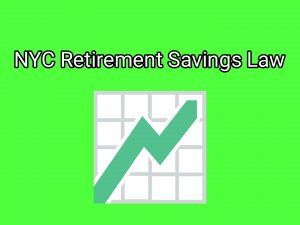On May 11, 2021, The City of New York enacted a local law that requires private sector employers located in New York City to provide a mandatory retirement savings program for their employees.
This program creates a mandatory auto-enrollment deduction individual retirement account (“IRA”) program for employees that work for private sector employers that employ five or more employees and do not currently offer a retirement plan, such as a 401(K), 403(B), or a defined benefit pension plan.
The law does not require employers to contribute to these plans. However, employers must remit funds deducted from the earnings of each employee for deposit into the program similar to the requirements for the Employee Retirement Income Security Act of 1974 (ERISA). Employers are required to inform the employees about the program. Employers are also required to maintain records of compliance with the program for up to three years.
This program requires employers to enroll employees who are older than 21 years old and who work at least 20 hours per week. The default rate for eligible employees is a 5% contribution rate, but employees have the opportunity to opt-out of the program or adjust this rate up or down. The contributions to the IRAs are capped at the annual IRA federal maximum of $6,000 for employees under the age of 50 and $7,000 for employees 50 years or older.
This plan is portable and can be rolled over into another retirement savings plan if the employee changes jobs and allows the employee to continue contributing to the plan.
The program will be administered by a retirement savings board that will consist of three members appointed by the Mayor. The board’s duties include determining the start date of the program, contracting with financial institutions and providers, minimizing fees, creating a process for participation, and conducting outreach to employers and employees. The board will also create a process for non-eligible employees to participate.
The law creates a procedure allowing eligible employees to submit complaints of violations to an enforcement agency within one year of the date the employee learned of the violation. Employers will be subject to penalties for failing to comply with the retirement program. An employer that failed to enroll eligible employees or properly remit funds will face fines for each individual.
The law states that employers will be subject to a $250 fine for an initial violation, $500 for a second violation within two years of the first, and a $1,000 fine for any subsequent violations within the two year window. Failing to properly retain records will also be subject to a $100 fine for each employee. Although these fines do not seem very high, these fines are for each eligible individual and can add up to a substantial amount.
The retirement law takes effect 90- days after enactment, meaning August 9, 2021. However, the board has up to two years to implement the program.
The language of this program makes clear that it will be operated in a manner that will not allow the employee benefit plan to fall under ERISA. The United States Court of Appeals for the Ninth Circuit found that state-mandated IRA programs for eligible employees of certain private employers which do not provide their employees with a tax-qualified retirement plan are not covered by ERISA.
This plan is not currently in effect due to the state’s Secure Choice program. New York State’s Secure Choice program was passed on June 7, 2021, and is awaiting signature by the governor. This program requires private employers who do not participate in a sponsored retirement plan to participate in a state-run, payroll-deduction Roth IRA program. This program is very similar to the New York City program with small differences, such as the state program applying to employees over 18 years old and the city program applying to employees over 21 years old. The city has announced that they will discontinue their program if the state establishes a retirement savings program that covers a substantial amount of employers that would have otherwise been covered by the city program in a similar manner.
Famighetti & Weinick PLLC are experienced employment lawyers on Long Island and in the New York Hudson Valley. Our employment attorneys are available at 631-352-0050 or on our website at http://linycemploymentlaw.com.
Today’s Long Island employment law blog was written by law student intern and Hofstra law school student, Danielle Jacobs.

NYC Retirement Savings Law
 Long Island Employment Law Blog
Long Island Employment Law Blog

